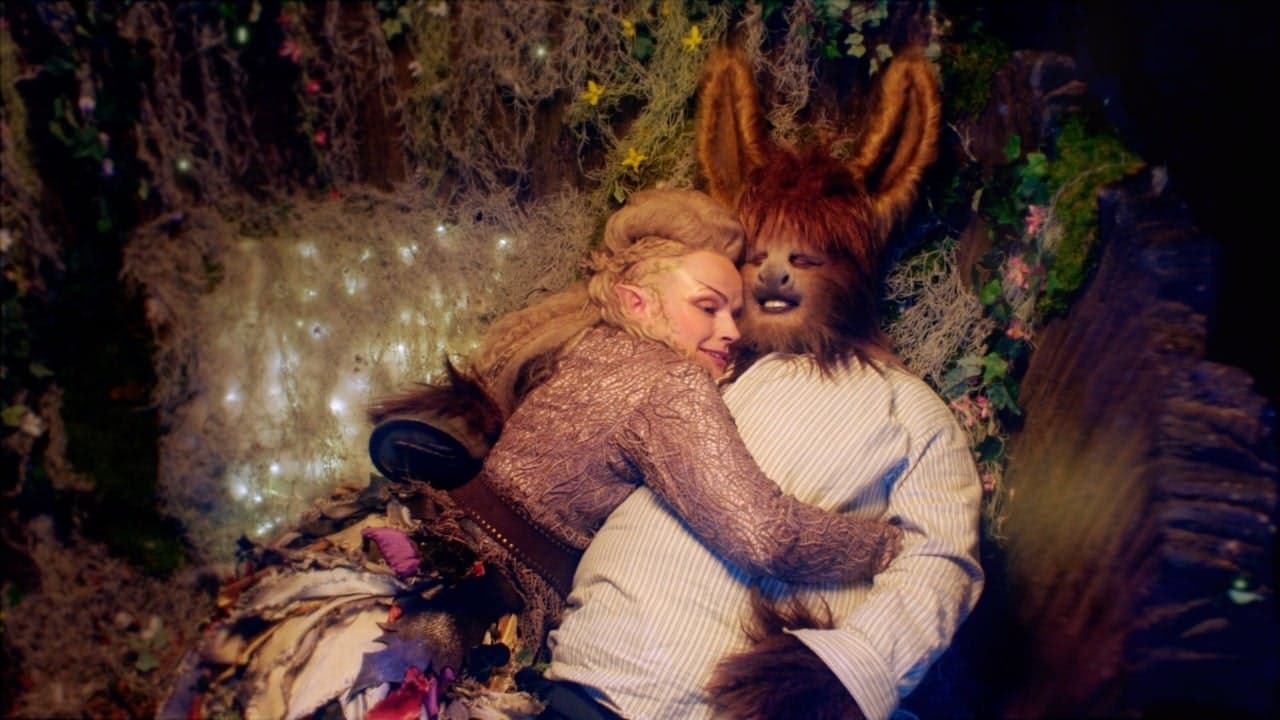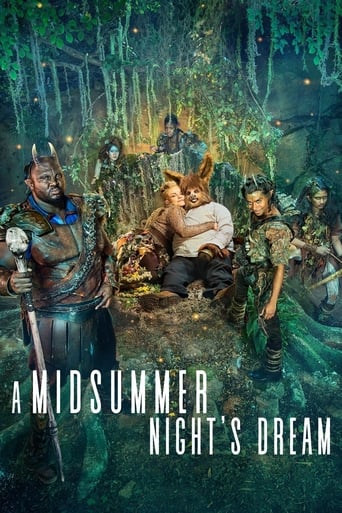Matcollis
This Movie Can Only Be Described With One Word.
Hadrina
The movie's neither hopeful in contrived ways, nor hopeless in different contrived ways. Somehow it manages to be wonderful
Ortiz
Excellent and certainly provocative... If nothing else, the film is a real conversation starter.
dcrozier-04696
This is nonsense. What are actors of Maxine Peake's calibre doing in a misconstrued, overwrought, inept production like this. I was shocked when I saw this as the BBC usually has a good grasp on Elizabethan theatre but not this time. Avoid it! The Storm troopers are more than an anachronism; the forest scenes and the fairies seem to be at odds with each other; the lovers don't seem to understand the consequences of running from Athens away from "the sharp Athenian law"; Bottom's dream isn't one; the mechanicals are just that, mechanical; and Titania and Oberon seem to be discussing a shopping list over a pint for most of their interaction. In the year of the 400th anniversary of his death I would have hoped the the BeeB would have produced something more satisfying than this forgettable Midsummer Night's fiasco.
l_rawjalaurence
Superficially David Kerr's production of A MIDSUMMER NIGHT'S DREAM resembles Shakespeare reinterpreted for DR. WHO aficionados. This is to be expected, given that Russell T. Davies has adapted the text. Special effects abound: the fairies disappear in puffs of smoke, Puck (Hiran Abeysekera) moves around the forest as a flash of light, while the camera pans rapidly over urban and rural landscapes, accompanied by heavenly choirs on the soundtrack (music by Murray Gold). This is the world of science fiction, where quite literally anything can happen.Yet beneath the colorful surface there lurks a highly original interpretation of the text. Duke Theseus (John Hannah) is a despot, ruling a fascist state festooned with Nazi-type symbols and policed by guards with faces obscured by military helmets. He keeps Hippolyta (Eleanor Matsuura) prisoner; he has her wheeled into his court tied to a cart, her face encased in a metal helmet preventing her from speaking. Egeus (Colin McFarlane) is equally despotic; if people do not submit to his will, then he will have them suitably dealt with.Life in the forest seems equally restrictive, as Oberon (Nonso Anozie) fight with Titania (Maxine Peake), and enlists Puck into his service to ensure that she suffers as much indignity as possible. The two male characters are fond of cackling evilly to each other as they contemplate the future success of their schemes.The only characters who appear to act naturally are the Rude Mechanicals. Led by an earnest Quince (Elaine Paige), they gather at the local pub to prepare for performing "Pyramus and Thisbe." Among a crowd of sociable regulars, they distribute the parts, much to Bottom's (Matt Lucas's) delight. As they leave the pub, the Rude Mechanicals embrace the locals, thereby emphasizing that human feeling does survive in Theseus's world, even if it is only evident among the poorest members of society.In the production's second movement, taking place in the forest, director Kerr and adapter Davies emphasize the play's transformative potential. The four lovers come to understand their depth of feeling for one another; Oberon reconciles himself to Titania; while Bottom remembers little about his experience of being transformed into an ass, but nonetheless wakes up with a renewed zest for life. The action unfolds in a golden, almost nostalgic orange glow that illuminates the trees and enables the characters to see one another for what they are.The action shifts back to Theseus's court, where the Duke's despotic rule continues unchecked. As he watches the performance of "Pyramus and Thisbe," he draws red crosses over the photographs of the Mechanicals on his IPad, suggesting that he will have them disposed of as soon as possible. No one else laughs at the performance; they all look fearfully as Theseus to see his reactions. The atmosphere soon changes, however, as Bottom-as-Pyramus enacts his death scene. Theseus bursts out laughing, clutches his heart and totters out of the room; on the IPad we witness his eventual demise. As soon as he leaves, everyone is free to act according to their inclinations; they welcome the performance, and give the Mechanicals a standing ovation. Theseus has quite literally died laughing, proving beyond doubt that despotism cannot suppress our natural inclinations.The production ends with a colorful dancing sequence. Hippolyta is released from her chains, and it turns out that she is a fairy. Both she and Titania sprout wings and fly up to the ceiling. On this view it seems that Oberon's decision to visit Theseus's court was prompted by the desire to rescue one of his own kind.As the entire company perform, Titania winks at Bottom, and Bottom starts, as if realizing just what happened during the previous night. Likewise Puck glances at the four lovers, reminding them of the control he once exercised over their lives. Through this strategy Kerr makes it clear that the "midsummer night's dream" was not just something playful, but taught the characters something about themselves and their deepest desires.This MIDSUMMER NIGHT'S DREAM was one of the best interpretations of the play I have seen in recent years. All credit to Davies for shaping such a competent script, which was brilliantly performed and directed by a top-notch group of creative personnel.
rboysdad
This is a daft and lovely play given a new bbc adaptation devised by Russell T Davies. The sense of the play comes through very well, and Maxine Peake's Titania is great, an actress who understands how to get the meaning across, whereas Michelle Pfeiffer in the 1999 Hollywood showing is less punkish than Peake (who is also wonderfully randy) but Pfeiffer seems not to understand the poetry or know how to get it over. Peake does.This production is for me enormously weakened by the presence of Matt Lucas who I find moderatelyh funny in some things he does, but the sub plot of the mechanicals can be terribly tedious and stupid and Lucas does his level best to make it worse. In the 1999 film Kevin Kline famously steals (perhaps) the whole film with his Bottom, and the whole group of nitwits, Roger Rees, Sam Rockwell et al. - the casting of these talents impresses versus the buffoonery of the bbc attempt.It's hard to dislike RTD's work, though I think he's nuts to make Athens a fascist state and to kill off Theseus like that, but the whole thing is so mad that I reckon it's all fair game. The lesbian and gay touches (I noticed 3 - Demetrius loves Lysander for a bit, Titania and Hippolyta snog, and a guard and a black man are very smitten thanks to Puck (both Pucks, Stanley Tucci and the less pronounceable beauty in the bbc version are superb)are lovely, though. I note there is a version by Julie Taymor but I've searched the net and it's not available. Maybe it is perfect and not another curates's egg?
Jim
A Midsummer Night's Dream has been a firm favourite of mine for many years and I have seen many version both on screen and in theatre. However I do not remember, when we studied A Midsummer Night's Dream in school, that it was written to be a homosexual romp and certainly no lesbian kissing. Maybe I will be regarded a die-hard traditionalist, but this wondrous play has all the magical ingredients in its original form which already provides plenty of scope for a variety of interpretations; so this work need no updating or unexpected twists to bring it to a new audience. Something of the historic context becomes lost along the way. Suffice to say, this has been deleted on my set-top box and if I am around in years to come, I will not be watching it on repeat. This is say because I have enjoyed some of Russell T Davies' previous work.

